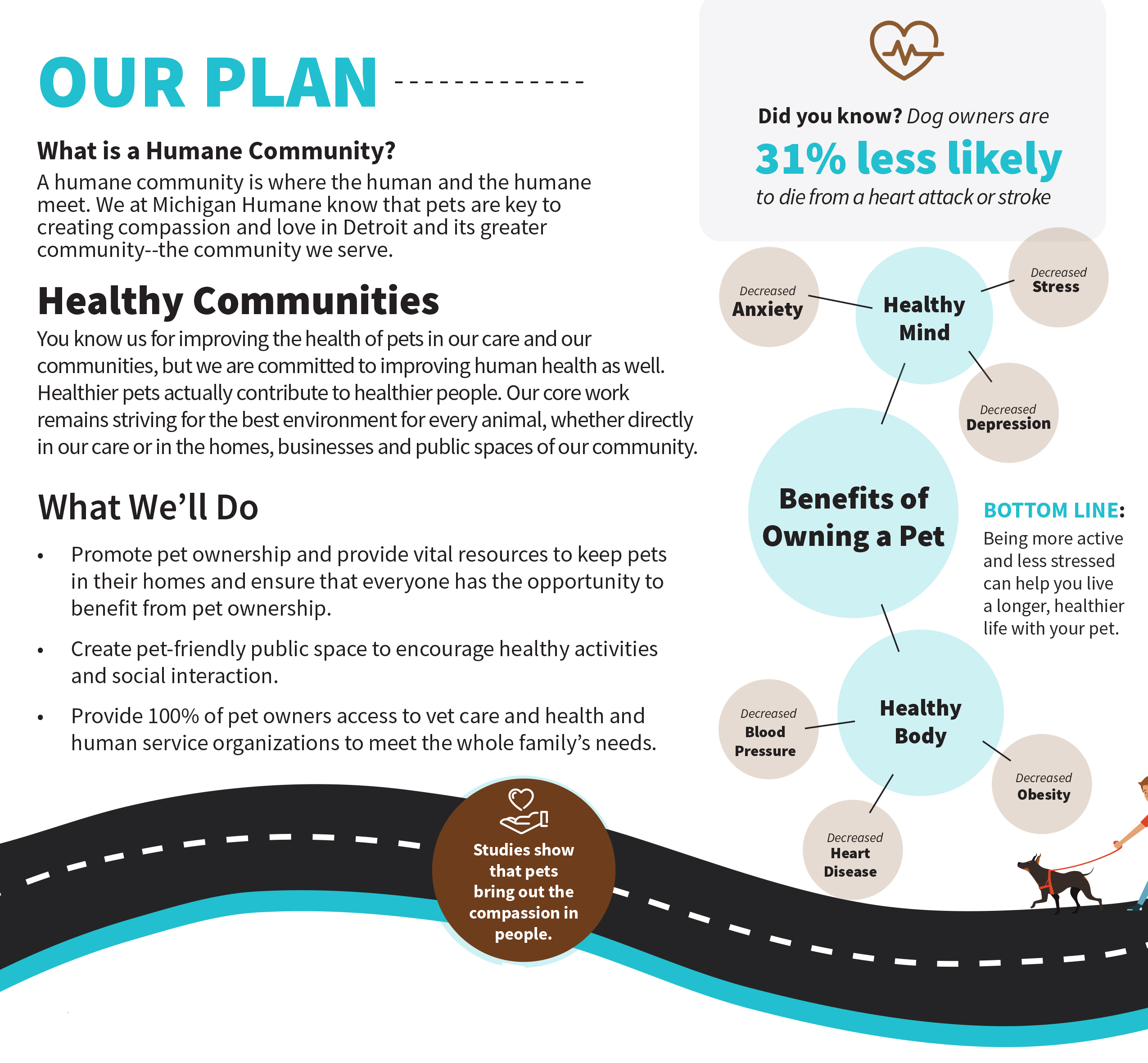
References
Public Health:
How to Stay Healthy Around Pets
Studies have shown that the bond between people and their pets can increase fitness, lower stress, and bring happiness to their owners. Some of the health benefits of having a pet include:
- Decreased blood pressure
- Decreased cholesterol levels
- Decreased triglyceride levels
- Decreased feelings of loneliness
- Increased opportunities for exercise and outdoor activities
- Increased opportunities for socialization
The Benefits of Pets for Human Health
Companion animals may improve heart health by lowering blood pressure and regulating the heart rate during stressful situations. In a 2002 study, researchers measured changes in heart rate and blood pressure among people who had a dog or cat, compared to those who did not, when participants were under stress (performing a timed math task). People with a dog or cat had lower resting heart rates and blood pressure measures at the beginning of the experiment than non-pet owners.
A similar study found that having your dog in the room lowered blood pressure better than taking a popular type of blood pressure medication (ACE inhibitor) when you are under stress.[5] Other research has indicated that the simple act of stroking a pet can help lower blood pressure and cholesterol.[6]
Children’s exposure to companion animals may also ease anxiety.
Findings suggest that the social support a pet provides can make a person feel more relaxed and decrease stress.[8]
Among elderly people, pet ownership might also be an important source of social support that enhances well-being.
Researchers found that people who said they had a pet in both 1996 and 2001 had the fewest doctor visits, followed by people who had acquired a pet by 2001; the group of people who did not have a pet at either time had the highest number of doctor visits.[11]
16 Science-Backed Reasons Adopting a Dog Could Be Good for Your Heart
- Studies show that dog owners may live longer than non-dog owners.
- Dog owners are 31% less likely to die from a heart attack or stroke than non-dog owners.
- People with prior heart events who had a dog living at home had a 65% reduced risk of death.
- Dog owners who walk their dogs regularly face one-third the risk of diabetes of those who don’t own a dog.
- Dog parents are more likely to reach their fitness goals than those without canine companions.
- Pet companionship may provide important social support and is a powerful predictor of behavior changes that can lead to weight loss.
- Dogs can help with chronic conditions and prevent chronic disease.
- Pet ownership is an important form of social support that can benefit patients with heart disease or stroke.
- When we see, touch, hear or talk to our companion animals, we feel goodwill, joy, nurturing and happiness. At the same time, stress hormones are suppressed.
- Studies show that the mere act of petting a dog decreases blood pressure.
- Having a pet can help increase fitness levels, relieve stress and boost overall happiness and well-being.
- Dogs help ease people out of isolation or shyness. Studies find that owning and walking a dog increases social interaction.
- Dog-owning families often promote physical activity within the household.
- Dog parents are more likely to fit in the recommended level of physical activity than those who don’t have a dog 15. Dog parents are 34% more likely to fit in 150 minutes of walking per week recommended by the AHA than non-dog owners.
- Dogs are always there to comfort you. They put a smile on your face every day.
Why Having A Pet Is Good For Your Health
In May 2013, the American Heart Association (AHA) released a scientific statement associating pet ownership with reduced heart disease risk factors and greater longevity.
Having a dog keeps you more active. Walking your dog can help you meet the daily exercise requirements the government recommends. In one study of more than 5,200 Japanese adults, dog owners were 54% more likely to get the recommended physical activity than non-owners.
Can Your Pet Help You Be Healthier?
Studies have shown pet ownership may help increase fitness levels, relieve stress, lower blood pressure and cholesterol levels, and boost overall happiness and well-being. Pets also provide social support, which is an important factor in helping you stick with new healthy habits.
10 Ways Pets Support Mental Health
A pet dog may protect children from anxiety, according to a study by the Centers for Disease Control and Prevention.
21 percent of the children who did not have a pet dog tested positive on a screening test for anxiety. However, only 12 percent of children with dogs tested positive for anxiety.
People feel more needed and wanted when they have a pet to care for. The act of caretaking has mental health benefits. Caring for another living thing gives us a sense of purpose and meaning.
The studies showed that pet owners had improved well-being in various areas, including the following:
- Better self-esteem
- More physically fit
- Less lonely
- More conscientious and less preoccupied
- More extroverted
- Less fearful.
A study conducted by AAHA (American Animal Hospital Association) found that over 90% of the pet owners surveyed indicated their awareness of the health benefits of owning a pet and acknowledged it clearly affected the quality of their daily lives. Some other important statistics include:
- 31% improved physical fitness
- 76% reduced stress level
- 65% mental health improved
Helps fight depression – gives us an interest in life, and provides a positive focus for us
Helps promote better overall health – research suggests this may even help reduce heart disease because it provides psychological and emotional stability during stressful periods
Helps reduce stress – interaction with our pets provides “instant” stress relief and relaxation without the use of drugs or stimulants.